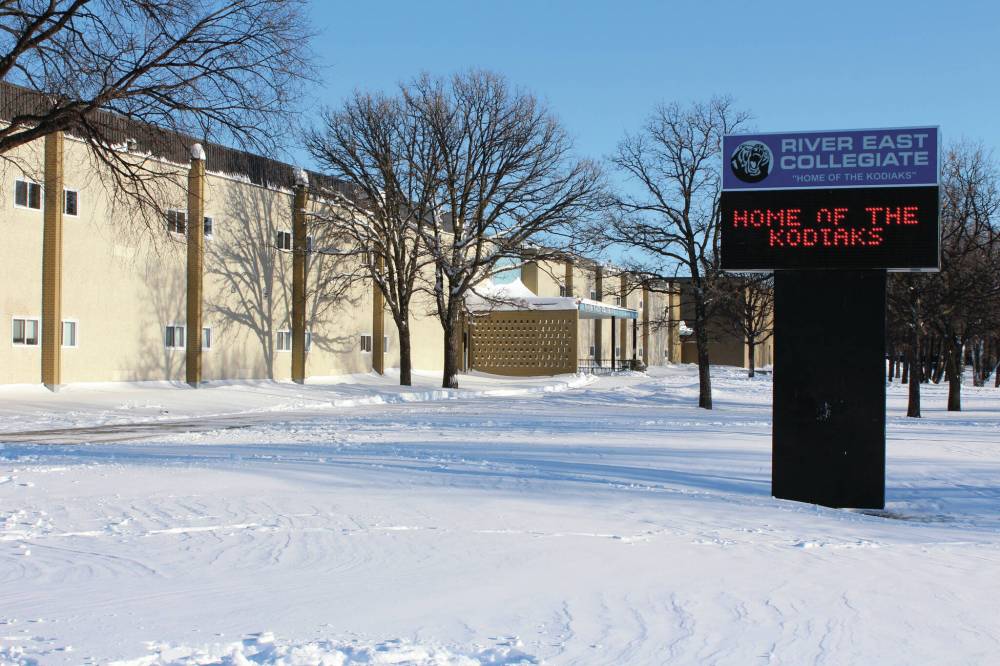German bilingual program ‘not going anywhere’
“Still work to be done,” parents say
Advertisement
Hey there, time traveller!
This article was published 05/03/2025 (322 days ago), so information in it may no longer be current.
A singular public German language education program isn’t going anywhere, according to officials.
Last year, families of students in the River East Transcona School Division’s German-English bilingual program formed Manitoba Parents for German Education, a non-profit advocacy group, and raised a number of concerns about the future of the program, the only one offered at public schools in the province.
On Feb. 26, the division held a virtual meeting to address those concerns and try to clear the air. While parents of students in the program are pleased with the assurances of the school division, they also say that there is “still work to be done.”

File photo
The River East Transcona School Division held a meeting on Feb. 26 to address concerns from parents of students in the division’s German-English bilingual program. In-division students, the division assured parents, will be able to continue attending schools the program is offered in, including River East Collegiate (pictured), whether or not they live within that school’s catchment.
“Since June, we’ve been pushing and advocating, and I think for the first time we feel that the community has felt heard. We’re grateful that in-division students don’t have to move,” said Angela Schellenberg of Selkirk, Man., mother of a child in the program at Donwood School. “It’s promising.”
Students in the German-English bilingual program spend half of their class time learning in German from kindergarten through Grade 8. Successful graduates of the program are eligible to study at university in Germany, where tuition is free.
Last year, there appeared to be some miscommunication between parents and the division regarding whether German bilingual students within the division would be allowed to continue attending schools outside their catchment areas. The program is only offered at Princess Margaret School, Donwood School, Chief Peguis Junior High School, and River East Collegiate.
“Our oldest, last year, got the phone call that she wouldn’t be accepted into the school. That was reversed after two weeks and our child was fortunate enough to continue,” said Lorlie Froese, the father of four children in the program, one at Princess Margaret, two at Chief Peguis, and one at River East. The family does not live in the catchment area for River East Collegiate. “We have lost lots of tears already in our house. And some anger has grown towards the school division for this.”
At the Feb. 26 meeting, RETSD officials clarified that all students from within RETSD who are registered in the program can continue to attend the program, regardless of which catchment they live in.
“That’s very good news, our family doesn’t need to move now,” Froese said. “The school division is saying the program is not going anywhere.”
“There has not been any student who is a resident of RETSD who has been denied access to the K-5, the 6-8, or the senior-level German language classes,” said RETSD superintendent Sandra Herbst. “We follow policies related to schools of choice within RETSD, which are also guidelines from the province. When a family chooses to register a child, we always look to see if there is a room.”
Still, concerns remain, including the fact the school division has limited enrolment of new students to residents within RETSD’s catchment area. Enrolment had previous been open to students from outside the division, as well.
“There are just a few of us on the outskirts who want this on our kids. They (classes) are not full,” Schellenberg said. “Why can’t we fill those classes? If people who want in can’t get it, there won’t be enough demand to keep it going. It will be slowly dismantled.”
According to the RETSD, the restrictions are the result of high demand for classroom space, as the division eagerly awaits construction of a new school in K-8 west Transcona, which was recently announced.
“When we follow schools-of-choice policy, that is for the school and not the program,” said Karen Boyd, RETSD assistant superintendent for educational programming. “Those students who remain in schools of choice, they will remain at the school. But when they change schools, that is another application. And when we’re thinking about that pathway, it is reaching capacity very fast.”
“We are experiencing unprecedented growth,” Herbst confirmed.
“We’ve increased enrolment by about 1,000 a year over the past few years. We’ve had to take a look at access by out-of-division schools-of-choice applicants. At this time, we are not able to accept out-of-division choice-of-school applications for the past few years.”
“We want to work with the division, to work for a better community,” added Schellenberg, who recently registered her youngest child in the new private Mennonite Brethren Christian Elementary School, which provides German language programming, for (nursery/kindergarten) in the fall.
“We’ll continue to advocate for the out of division students who are already in the classrooms, so there’s still work to be done.”

Sheldon Birnie
Community Journalist
Sheldon Birnie is a reporter/photographer for the Free Press Community Review. The author of Missing Like Teeth: An Oral History of Winnipeg Underground Rock (1990-2001), his writing has appeared in journals and online platforms across Canada, the U.S. and the U.K. A husband and father of two young children, Sheldon enjoys playing guitar and rec hockey when he can find the time. Email him at sheldon.birnie@freepress.mb.ca Call him at 204-697-7112
Our newsroom depends on a growing audience of readers to power our journalism. If you are not a paid reader, please consider becoming a subscriber.
Our newsroom depends on its audience of readers to power our journalism. Thank you for your support.



